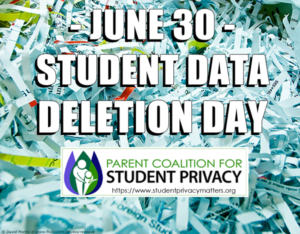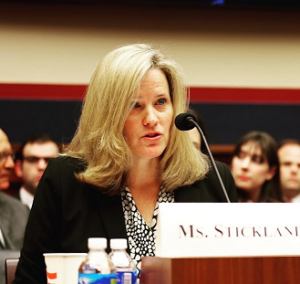As a parent I was always happy that my child started out with a clean slate each year. Right now schools & their vendors collect far too much personal data — and use them in ways that are non- transparent and vulnerable to breaches. Parents are justifiably fearful that negative incidents in their children’s past may enter into their “permanent record” and create damaging stereotypes that might bias their teachers against them, or be inserted into algorithms with discriminatory outcomes– creating self-fulfilling prophecies. This is why we support Bradley Shear’s brilliant concept of “data deletion” day — to urge schools to allow kids the freedom to create their own future, without being burdened by data that could be breached or used against them –or pin them down to the past.
Check out Brad’s post below – reprinted from his must -read blog — and feel free to use the template letter he designed to send to your children’s schools, urging them to delete any non-essential personal data for your child on June 30, and asking them to demand their vendors do the same. –Leonie Haimson
Our K-12 public schools are collecting an enormous amount of data about our kids that will pre-determine whether their dream schools will give their applications a fair assessment and if prospective employers will give them a chance to interview for an opening.
The type and amount of data being accumulated and stored by our public schools and third-party vendors is staggering. For example, some elementary schools deploy identification cards with RFID chips that track when and how many times our kids go to the bathroom, how long they spend inside a bathroom stall while taking care of their personal business, and how many times they go to the water fountain along with all of their daily movements in and within the school’s property. Other schools utilize biometric palm readers that scan our kids’ hand or fingerprints to track everything our kids buy in the school cafeteria. All of this cumulative data is a honey pot for colleges, employers, insurance companies, data brokers, cyber criminals, foreign governments, etc…
Every time our kids may be admonished for talking out of turn or texting in class they may receive a permanent demerit in Class Dojo. In the near future, classrooms may be filled with cameras and other tracking technologies that also analyze our kids every interaction with their teachers and class mates. This is not some type of crazy prediction; in China, this Orwellian future is already a reality.
Multiple companies in the educational technology space have intentionally misled students, parents, teachers, administrators, and lawmakers about how they are using the personal data they are collecting about our kids in school. For example, Google was caught intentionally scanning student emails for advertising and other troubling purposes despite prior promises it was not. ConnectEDU tried to sell personal student data for profit when it went bankrupt despite promising not to do so. Edmodo, another educational technology company, was recently caught surreptitiously tracking students online to monetize their web surfing habits despite promises to the contrary.
As a parent and privacy advocate, I have come to the realization that more needs to be done to raise awareness about these issues and to effectuate change. Therefore, I am calling for all K-12 public schools and their vendors to automatically delete the following data points each and every June 30th after the school year has ended:
-All student Internet browsing history
-All student school work saved on platforms such as the Google G Suite
-All student created emails (and all other digital communications)
-All behavioral data points/saved class interactions (e.g. Class Dojo data points)
-All student physical location data points (e.g. obtained via RFID tags)
-All biometric data collected and tied to a student account (e.g. meal purchase information)
-Etc…
–An Easy To Follow School-Data-Deletion-Request-Template
This is just the beginning of the conversation and as our schools collect more data points on our kids more data will need to be automatically deleted at the end of each school year. Each public school system and their vendors must be required to certify in writing that the requested data deletion has occurred.
None of these above data points were kept on the Greatest Generation, Baby Boomers, or Generation X so they are not needed to be collected and saved for future generations. If we really want to make “America Great Again,” kids should be allowed to be kids without the fear that their every move is tied to them for the rest of their lives.
Some educational technology vendors, industry funded think tanks/associations, and academics (e.g. George Mason University’s Law & Economics Center) may falsely claim deleting this data will harm our children and deprive parents and teachers of the knowledge they need to make more informed choices. Some arguments against automatic data deletion may include: it should be the parents choice, the data is needed for personalization, the information is needed to help improve the service offering so it will help better educate our kids, etc…
None of these arguments are valid and should not be believed. Parents should not have to opt into protecting their children’s privacy, safety, security, and future. If a parent doesn’t want their child’s data deleted then they have the right to opt out of automatic data deletion.
Privacy is the corner stone of a free and vibrant democracy. Therefore, we need to start by better protecting our kids in school. The amount of data being collected on our children is staggering and no matter how hard I have advocated for stronger student data privacy laws and for stronger digital privacy laws, I have been out gunned by lobbyists funded by companies that relish an Orwellian society they can easily monetize.
As a parent, for the sake of our kids and future generations, I ask that you support National Student Data Deletion Day on June 30th by sending in an email or snail mail demanding that your public school system and their vendors start an annual purge of all the unnecessary data points collected about our kids.
Before our kids email and other school provided digital accounts are set up for the following school year, all prior non-essential data (most of the data is non-essential) should be deleted. Our children should be given a fresh start every school year just like we were when we attended school.
Data discrimination is real and to help prevent it now is the time to act before its too late! Please HELP OUR KIDS BE KIDS IN THE DIGITAL AGE! — Bradley Shear


